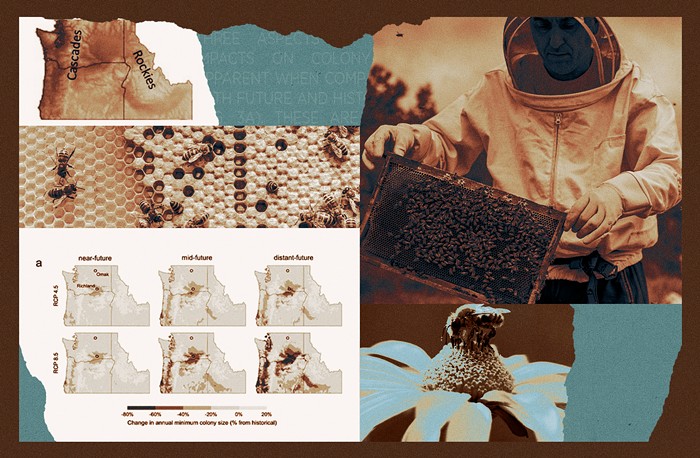
Something strange is happening in America right now: People are talking about climate change.
Before The Stranger saved and then quickly crushed my body, mind, and spirit, I worked for Grist, the Seattle-based online magazine with a focus on climate change. (Apropos of nothing, Grist unceremoniously booted me and four out of five of the staff writers a few days after Donald Trump took office, but I'm not bitter. Really. The office was always freezing and it's going to get creamed when the earthquake comes.) While I was at Grist, what I noticed through writing about climate change five days a week, was that no one gave a shit. We had a dedicated audience of 6 to 10 commentors (everyone's favorite was a gay man in New York who primarily used the comment section to hit on a very cute young intern named Sam), but for the most part, people just didn't care. Nothing makes someone's eyes glaze over faster than the word's "climate change."
It's kind of wild how little people are paying attention: climate change is leading to huge increases in human suffering as parts of the world dry up and others flood, burn, and blister. The repercussions of this man-made phenomenon are genuinely terrifying, and not just for tree-huggers and nature-lovers. There's some evidence, for instance, that the conflict in Syria was in part sparked by climate change-connected drought and subsequent food shortages, which then led to the migrant crisis currently embroiling Europe... which, in turn, led to a resurgence of white nationalism and xenophobia in places like Italy, France, and the UK. Climate change touches everything, and yet, we really don't talk about it much. Broadcast news organizations ABC, NBC, CBS, and Fox had a combined total of 50 minutes of climate change coverage in 2016. That's less than the Jolie-Pitt breakup. The world is burning, and we're over here freaking out about celebrity divorce.
In recent weeks, however, there's been a noticeable uptick in climate change news, inspired, I'm guessing, by the catastrophic wildfires currently burning through California. Climate change is easy to ignore until a wildfire threatens to destroy your neighborhood. Here's how Google has tracked in the term over the past 30 days.
In the midst of these disasters, NPR has been discussing climate change every day, and the networks and cable changes have at least mentioned the words. Even Jimmy Kimmel talked about it on his show Tuesday night, with a message that was designed to reach the heart of one Donald J. Trump:
But will an uptick in coverage have any affect on public policy? And is there still time to correct this collision course? According to a report released this week by a international team of climate scientists, we're reaching the "too-little-too-late" stage of ecological collapse. The paper portrays a potential future of dead forests, rapid sea level rise, and storms that make Sandy, Maria, and Katrina look minor if we don't transition to a carbon-neutral economy yesterday. It does not look good.
The media immediately jumped on the study, issuing dire headlines about the end of mankind, but the paper's author took issue with this sort of coverage. She pointed out on Twitter that people probably weren't reading the study if their takeaway from it was that it's too late. The truth, according to the researchers, is that it's not too late—at least, if we actually take action on fossil fuels now, not later. Of course, Donald Trump is the kind of man who thinks wind turbines are ugly and diesel exhaust smells like money, so under this administration and with Republicans in control of Congress, the hope of any sort of progressive action on climate change is smaller than none. Still, there's an election coming in a mere 90 days. If we're going to get leaders in office who are willing to help up save ourselves, now may very well be our last chance to do it. There's no excuse this time; each and everyone of us who is concerned about the fate of the planet—and our species—must vote.















